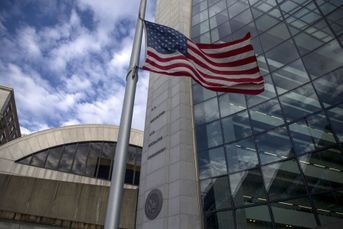Bond investors pessimistic as U.S. economic growth improves

Lack of wage growth stoking fears of disinflation while Fed prepares to lift interest rates
Bond investors can be a gloomy bunch, glass-half-empty types who see bad news everywhere.
But they haven’t been this downbeat about growth and inflation in the U.S. economy since 2008, when the bottom fell out during the financial crisis.
That’s one view, anyway. Most economists say things are getting better, not worse. Growth is up, jobs are back and wages are poised to rise. The Federal Reserve is preparing to raise interest rates for the first time since 2006.
And yet Treasury yields keep hitting one low after another, a sign that some investors believe the broadening recovery could yet give way to a bout of deflation — the kind that hinders investment and spending — as oil tumbles and global growth deteriorates. One bond-market metric already suggests consumer prices will drop in the next year.
(More: Core bonds a key in diversification)
“Maybe the U.S. can’t diverge and grow on its merry way,” said William O’Donnell, the head U.S. government bond strategist at Stamford, Conn.-based RBS Securities Inc., one of 22 dealers that trade directly with the Fed.
What’s happening in the $12.5 trillion market for Treasuries reflects a confluence of several powerful forces, not all of which necessarily spell doom for the U.S. economy.
The first is the plunging price of commodities, which may reflect greater doubt about the state of affairs outside the U.S. Crude oil has plummeted 54% since June, while copper slumped to its worst start to a year since 1988. That’s particularly worrying given that Europe already confronts deflation and China’s economy is cooling down.
NEGATIVE YIELD
The second boils down to risk and reward. When things look dicey, investors pile into Treasuries, driving down yields.
And even now, with yields on 10-year notes falling by the most on a year-to-date basis since the 1960s, they’re higher than more than a dozen countries including Germany, Canada and Italy. In Switzerland, benchmark yields have gone negative.
“We’re the last refuge in the global economy,” said Mitchell Stapley, the chief investment officer at Cincinnati-based ClearArc Capital, which manages $7 billion. “I don’t know that’s there’s much of a fear about our economy.”
Economists surveyed by Bloomberg say lower fuel prices will put more money in Americans’ pockets and boost U.S. growth by 3.15% this year, the fastest in a decade. Consumer confidence is already surging after more jobs were added last year than any time since 1999.
That hasn’t been enough to convince the bond market, which has been unparalleled in predicting the actual rate of price increases over the past decade.
Demand for Treasuries has soared this year, pushing down yields on the 10-year note to 1.84% through last week. Those on the 30-year bond slumped to 2.35%, the lowest since the U.S. started regularly issuing the securities in 1977.
Based on prevailing yields, bond investors see cost-of-living increases staying below the Fed’s 2% annual target for at least 30 years. The inflation gauge used by the central bank to guide its monetary policy tumbled past the levels during the financial crisis to a 16-year low of 1.76%.
U.S. consumer prices actually fell from the previous month, plunging by the most since 2008.
“What we’re seeing is the U.S. cannot escape disinflationary pressure,” said Gemma Wright-Casparius, who manages $24.3 billion of inflation-linked securities at Vanguard Group Inc.
BOND PESSIMISM
Bond investors are decidedly pessimistic because falling joblessness and a strengthening economy hasn’t translated into consistent wage gains or consumer demand that was prevalent pre-crisis, said Bradley Wilson, a fixed-income manager at Boston Private Wealth Management, which oversees $9 billion.
Hourly earnings tumbled by the most on record in December, while retail sales fell. Prior to that, U.S. wages were flat or rose just 0.1% in five of the previous nine months.
“Wage growth has got to improve,” Wilson said. Without that, “we just don’t see inflation on the horizon.”
Lower energy prices, far from helping Americans, will ultimately hurt the U.S. economy and send yields on Treasuries even lower this year, according to Jeffrey Gundlach, the co-founder of DoubleLine Capital, which oversees $64 billion.
While cheaper oil fueled growth at the end of 2014, the expansion may disappoint this year as spending and hiring in the energy industry dry up and cause a “ripple effect” in the economy, he said.
Hiring from oil-producing states such as Texas, Oklahoma and North Dakota has accounted for 67% of U.S. jobs growth since 2007, data compiled by Bloomberg show. A report on Jan. 2 showed companies are putting off investments on petrochemical-related products in anticipation of price cuts.
“There’s a more sinister side to the oil decline,” Mr. Gundlach said in a Jan. 14 webcast. “Growth for the U.S. may be downgraded as we move past the middle of the year.”
That should be a warning for the Fed, which is preparing to end six years of near-zero rates sometime this year.
In the central bank’s Dec. 17 statement, policy makers said they expect inflation to rise toward its target as the “transitory effects of lower energy prices” recede.
By plowing ahead with rate increases, which most economists expect by mid-year, the Fed may further jeopardize the strength of the U.S. expansion, according to Krishna Memani, the New York-based chief investment officer of OppenheimerFunds’s $79.1 billion of fixed-income assets.
“That’s probably the thing that ought to scare the Fed a lot more,” he said. “It may come back to bite them.”
Learn more about reprints and licensing for this article.








